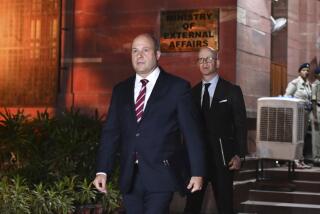Soviets Oust 5 U.S. Diplomats as Spies : Shultz Promises Action in Response to Unprecedented Mass Expulsion
- Share via
MOSCOW — The Soviet Union on Sunday expelled five American diplomats on spying charges, and Secretary of State George P. Shultz immediately said the United States will take unspecified action in response.
Records available here showed no precedent for such a mass expulsion of Americans from Moscow in the 53-year history of U.S.-Soviet relations.
The announcement came after the last five of 25 Soviet diplomats assigned to the Kremlin’s mission at the United Nations in New York City left for home after being ordered to leave by Washington in an unprecedented move.
But there was no reference to the expulsions of Soviet diplomats from New York in the terse announcement here about the Americans being officially declared unwelcome.
Ousters Called Illegal
However, Soviet officials in the past have branded the expulsions from their U.N. mission as illegal and have vowed to take retaliatory measures.
Shultz, appearing on a television interview program in the United States, said President Reagan will decide on appropriate action to take in response to the ousters.
“We will protest and will take some action,” Shultz said, without specifics.
The Soviet Foreign Ministry accused the five Americans of engaging in “actions which are incompatible with their official status”--the normal diplomatic jargon for espionage.
A three-paragraph announcement by Tass, the official news agency, provided no details of their alleged activities but concluded:
“The attention of the U.S. Embassy was again drawn to facts of the continuing use of American diplomatic missions in the Soviet Union for illegal activities against the Soviet Union, and the demand was made that appropriate measures be taken to stop them.”
An American Embassy spokesman identified the five diplomats as William Norville, a first secretary; Charles Ehrenfried, a third secretary; David Harris and Gary Lonnquist, attaches, all from Moscow, and Jack Roberts, a staff member at the U.S. Consulate in Leningrad.
The spokesman, however, declined to describe their duties, invoking the customary practice at the U.S. Embassy in Moscow of refusing to comment on accusations of spying.
Tour of Duty Over
There was no indication how much time the five were given to leave the country. Norville was about to depart after completing his normal tour of duty, embassy sources said. Attempts to reach him at home were unsuccessful.
None of the other four is listed in the latest edition of Information Moscow, an unofficial telephone directory of diplomats, journalists and business representatives in the Soviet capital. This, however, could indicate that they arrived too recently to be listed.
The expulsion order came nearly three weeks after the dramatic departure of American journalist Nicholas Daniloff, who was accused of spying but was not tried.
It was shortly after Daniloff’s release from a KGB prison into the custody of the U.S. Embassy here that Washington ordered the departure by Oct. 1 of 25 Soviets from Moscow’s U.N. mission under accusations of spying.
While most of the diplomats listed by Washington had left by the deadline, according to Soviet Foreign Minister Eduard A. Shevardnadze, the rest were granted a reprieve until after the Oct. 11-12 Reykjavik summit meeting of Reagan and Soviet leader Mikhail S. Gorbachev.
But the issue of the expulsions by Washington never came up in Iceland, where the two leaders focused on new arms control proposals and, according to their announcements afterward, almost reached a historic agreement.
On Sunday in the United States, an interviewer on NBC’s “Meet the Press” asked Shultz if all 25 of the Soviet diplomats expelled by Washington were indeed spies, and Shultz replied: “They are people that we feel have some connection with espionage activity, or at least are affiliated with units in the Soviet Union that engage in that activity.
All 25 Have Left
“At any rate, we handed over a list of 25 names, and all of those people have left (the United States).”
No immediate official explanation, beyond the statement about their alleged “incompatible actions,” was given for the expulsion of the Americans.
Last fall, when Britain expelled 31 Soviet diplomats, journalists and other officials as accused spies, Moscow retaliated by kicking out 31 British diplomats, journalists and business representatives. Since then, however, nearly all the vacancies created by the expulsions have been filled by replacements in both Moscow and London.
Two Expelled Earlier
Aside from Daniloff, the last American to be kicked out of Moscow was Erik N. Sites, an embassy attache ousted in May after being accused of spying. In March, another diplomat, Michael Sellers, was also thrown out on espionage charges. Both had left the country by the time the actions against them were made public.
Their ousters were attributed by some analysts to disclosures by Edward Lee Howard, a former employee of the CIA who defected to the Soviet Union and is now reported to be living on the outskirts of Moscow.
While he was working for the CIA, Howard was being groomed for assignment in Moscow, and he apparently provided the KGB with information about an American espionage network that resulted in several Soviet agents being arrested. At least one of the latter was reportedly executed.
More to Read
Sign up for Essential California
The most important California stories and recommendations in your inbox every morning.
You may occasionally receive promotional content from the Los Angeles Times.













